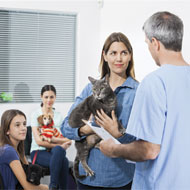Majority of vets threatened by clients

Companion animal vets or those working in a mixed practice are more likely to have experienced difficult clients.
The majority of vets say that they or a colleague have felt threatened by clients, prompting the BVNA and BVA to issue advice on dealing with the problem.
According to figures from the BVA’s Voice of the Veterinary Profession Survey, 85 per cent of vets have felt intimidated by a client’s language or behaviour. Many commented that support staff such as receptionists often encounter much of the abuse.
Companion animal vets or those working in a mixed practice are more likely to have experienced difficult clients, with 89 per cent reporting some form of intimidating experience. The survey also found that younger vets and females were much more likely to have experienced some form of intimidation.
The survey findings reveal that much of the abusive behaviour related to the cost of treatment. Nine out of 10 vets working in clinical practice said that either they or a member of their team had dealt with a ‘difficult’ client. Ninety-eight per cent of vets commented that at some time they felt under pressure to waive fees or accept a late payment.
“These statistics make for sad reading, but are certainly not surprising,” commented BVNA president Sam Morgan. “Working within practice we have all either been subject to or witnessed that ‘difficult’ client, but we must remember any form of harassment is unacceptable. It’s important not to feel alone in these situations and to ensure there is awareness and support throughout the veterinary team.”
President of the British Veterinary Association, John Fishwick, added: “Every situation is different and has to be dealt with on an individual basis, but it’s concerning to see the figures around challenging client behaviour and fees. Owning an animal is an important responsibility and will cost tens of thousands of pounds over its lifetime.
“It’s important for everyone in the vet team to take pride in the healthcare and treatment they deliver, and, equally, they must feel valued for their services. These figures emphasise the importance of managing expectations around fees by ensuring a two-way discussion about options and costs so clients can make a decision in collaboration with the veterinary team.”
This week marks National Work-Life Week and, to highlight wellbeing at work, the BVNA and BVA have teamed up to provide advice on how to deal with intimidating clients.
The advice is as follows:
• Try to remain calm, at all times; be confident but never aggressive.
• Personal safety for the veterinary team is the highest priority. If you feel intimidated by a client, try to not be alone with them. If you do not feel able to resolve the immediate scenario and you are concerned about your safety then politely ask the client to leave. If you see other team members facing difficult clients, do not leave them alone, remain within sight so you can go and get more help or step in and support your colleague.
• Although easier said than done, try not to take it personally. If you are on the receiving end of this behaviour, it can be upsetting and a cause of significant stress.
• Always discuss with your colleagues any difficult situation you have encountered with a client. Consider how well you handled the situation: what did you do well, what could you have done better, what was the final outcome. Think about what you have learnt and use it when you next encounter a difficult client and learn from each other. Work together to have a practice policy on how to deal with intimidating situations.
• Remember to inform the practice manager or practice principal so that appropriate practice level steps can be taken.
• Use clear messaging within the practice that harassment and violence will not be tolerated. Clients should be made aware of what unacceptable behaviour means.
• Remember that people’s behaviour can arise for many different reasons, including distress associated with their pet being ill. While not excusing the behaviour, it can help to diffuse a situation if the owner can have the opportunity to get all their concerns out. This can be done by active listening attentively and ensuring the client knows you have heard by reflecting these concerns back to them. Clients may also need to be reassured that ‘they’ve made the right decision’ or ‘we’re doing everything we can’, or even checking with the owner that they understand everything you’ve told them or ask them if they have any questions they’d like to ask.
• Consider attending training courses on understanding and dealing with these types of situations to help you and your clients.



 The Veterinary Medicines Directorate (VMD) is inviting applications from veterinary students to attend a one-week extramural studies (EMS) placement in July 2026.
The Veterinary Medicines Directorate (VMD) is inviting applications from veterinary students to attend a one-week extramural studies (EMS) placement in July 2026.